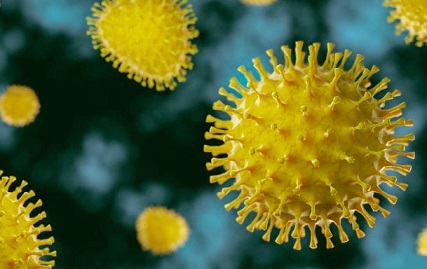American study discovers that Malectin is a key player in coronavirus replication and viral protein production
Nikhil Prasad Fact checked by:Thailand Medical News Team Aug 12, 2024 7 months, 3 weeks, 3 days, 6 hours, 19 minutes ago
COVID-19 News: Researchers from Vanderbilt University have made a significant discovery in the fight against coronaviruses, identifying a protein that plays a crucial role in the replication and spread of these viruses. The study, conducted by experts from the Department of Biological Sciences, the Vanderbilt Institute of Infection, Immunology, and Inflammation, and the Department of Chemistry, focuses on a glycoprotein quality control factor known as Malectin (MLEC). This
COVID-19 News report delves into the key findings of the study, which highlight Malectin's potential as a target for future antiviral therapies.
 American study discovers that Malectin is a key player in coronavirus replication
American study discovers that Malectin is a key player in coronavirus replication
and viral protein production
The Role of Nonstructural Proteins in Coronavirus Infection
Coronaviruses, like the one that causes COVID-19, have a unique ability to hijack host cellular systems to ensure their replication and spread. This process involves various viral nonstructural proteins (nsps) that interact with host cell proteins, altering the cellular environment to favor viral replication. Two such nsps, nsp2 and nsp4, are of particular interest due to their roles in establishing viral replication centers within host cells.
The researchers aimed to better understand these interactions by conducting a comprehensive analysis of nsp2 and nsp4 from several coronaviruses, including SARS-CoV-2, the virus responsible for COVID-19. Using a combination of quantitative proteomics and functional genetic screening, the team identified several host proteins that interact with these viral nsps, with Malectin emerging as a key player.
Malectin: A Pro-Viral Factor
Malectin is a glycoprotein quality control factor found in the endoplasmic reticulum (ER) of host cells. Its primary function is to ensure that proteins, especially glycoproteins, are correctly folded and processed before they are transported to their final destinations within or outside the cell. However, the study found that Malectin also plays a crucial role in coronavirus replication.
The researchers discovered that knocking down Malectin in infected cells led to a significant reduction in the production of viral proteins and, consequently, a decrease in the replication of the virus. This reduction was observed not only in the mouse hepatitis virus (MHV), a model betacoronavirus used in the study, but also in SARS-CoV-2. This finding suggests that Malectin is a pro-viral factor that facilitates the replication of coronaviruses by promoting the biogenesis of viral proteins.
How Malectin Interacts with Coronavirus Proteins
The study revealed that during coronavirus infection, nsp2 interacts with proteins associated with Malectin, particularly those involved in the oligosaccharyltransferase (OST) complex, a crucial component in viral glycoprotein production. This interaction appears to stabilize the association between Malectin and the OST complex, enhancing the production of viral glycop
roteins, which are essential for the virus's ability to infect host cells and replicate.
Interestingly, while Malectin itself was not found to interact directly with nsp2, the study showed that nsp2 interacts with several proteins that are known to associate with Malectin. This suggests that nsp2 may indirectly recruit Malectin to replication sites within the host cell, facilitating the production of viral proteins necessary for replication.
Malectin's Role in Early Stages of Coronavirus Replication
The research also explored the specific stages of coronavirus replication that Malectin influences. The findings indicate that Malectin does not play a significant role in the early stages of viral entry into host cells. However, it is crucial for the production of viral replicase proteins, which are necessary for the replication of the viral genome. The knockdown of Malectin resulted in a significant reduction in the levels of these replicase proteins, leading to a corresponding decrease in viral genome replication and the production of structural proteins required for new virus particles.
Furthermore, the study found that Malectin's role in promoting viral replication is closely linked to its function in the glycoprotein biogenesis pathway. When the glycan transfer activity of the OST complex was inhibited using a small molecule, the reduction in viral replication was similar to that observed when Malectin was knocked down. This result confirms that Malectin promotes coronavirus replication through its canonical function in glycoprotein biogenesis.
Implications for Antiviral Therapy
The discovery of Malectin's role in coronavirus replication has significant implications for the development of new antiviral therapies. Since Malectin is a host protein that is essential for the replication of multiple coronaviruses, including SARS-CoV-2, it presents a promising target for broad-spectrum antiviral drugs. By inhibiting Malectin or disrupting its interactions with viral nsps, it may be possible to significantly reduce the replication and spread of coronaviruses, including potential future variants or emerging strains.
Conclusion
This study, conducted by researchers from Vanderbilt University, has provided valuable insights into the role of the glycoprotein quality control factor Malectin in coronavirus replication. By interacting with the viral nonstructural protein nsp2 and facilitating the production of viral proteins, Malectin plays a crucial pro-viral role that makes it a promising target for future antiviral therapies.
The findings, which were published in the peer-reviewed journal eLife, suggest that targeting Malectin could lead to the development of broad-spectrum antiviral drugs capable of combating a wide range of coronaviruses.
https://elifesciences.org/reviewed-preprints/100834
For the latest
COVID-19 News, keep on logging to Thailand Medical News.
Read Also:
https://www.thailandmedical.news/news/japanese-study-finds-that-covid-19-infections-and-vaccines-are-inducing-the-emergence-of-atypical-memory-b-cells
https://www.thailandmedical.news/news/austrian-study-warns-that-covid-19-causes-depletion-of-key-innate-and-adaptive-immune-cells
https://www.thailandmedical.news/news/sars-cov-2-is-able-to-directly-infect-and-damage-tongue-tissues
